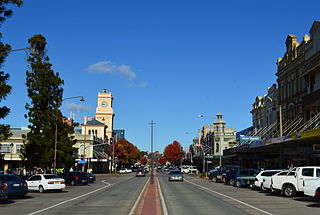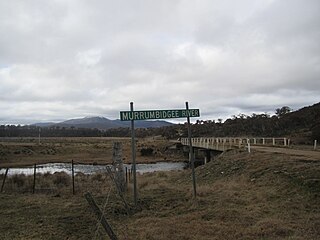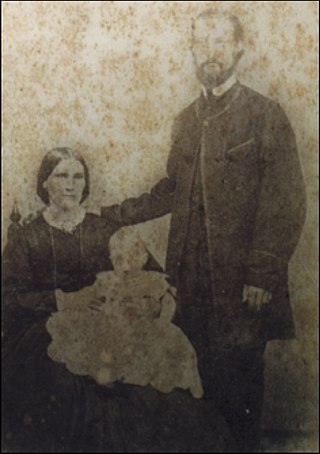
Goulburn is a regional city in the Southern Tablelands of the Australian state of New South Wales, approximately 195 kilometres (121 mi) south-west of Sydney, and 90 kilometres (56 mi) north-east of Canberra. It was proclaimed as Australia's first inland city through letters patent by Queen Victoria in 1863. Goulburn had a population of 23,835 at June 2018. Goulburn is the seat of Goulburn Mulwaree Council.

Upper Lachlan Shire is a local government area in the Southern Tablelands region of New South Wales, Australia. The Shire was formed in February 2004 from Crookwell Shire and parts of Mulwaree, Gunning and Yass Shires.

Breadalbane is a small village located in the Southern Tablelands of New South Wales, Australia in Upper Lachlan Shire. It is located on the Lachlan River headwaters and not far from Goulburn. At the 2021 census, Breadalbane had a population of 107.

Ben Hall was an Australian bushranger and leading member of the Gardiner–Hall gang. He and his associates carried out many raids across New South Wales, from Bathurst to Forbes, south to Gundagai and east to Goulburn. Unlike many bushrangers of the era, Hall was not directly responsible for any deaths, although several of his associates were. He was shot dead by police in May 1865 at Goobang Creek. The police claimed that they were acting under the protection of the Felons Apprehension Act 1865, which allowed any bushranger who had been specifically named under the terms of the Act to be shot, and killed by any person at any time without warning. At the time of Hall's death, the Act had not yet come into force, resulting in controversy over the legality of his killing.

Patrick Daley, known informally as 'Patsy' Daley, was a 19th-century Australian bushranger. Daley was the younger cousin of John O’Meally, a member of Frank Gardiner’s gang of bushrangers who robbed the gold escort near Eugowra in June 1862. By early 1863 Patsy Daley had joined with O’Meally and Ben Hall in a series of robberies carried out in the Young district. Daley was captured in March 1863 and sentenced to fifteen years hard labour. He was released in 1873. Daley married and settled in the Cobar district, becoming a successful businessman and hotel-owner.

The Archdiocese of Canberra and Goulburn is a Latin Church ecclesiastical territory or archdiocese of the Catholic Church located in the Australian Capital Territory, and the South West Slopes, Southern Tablelands, Monaro and the South Coast regions of New South Wales, Australia. Erected in 1948, the archdiocese is directly subject to the Holy See.

Collector is a small village on the Federal Highway in New South Wales, Australia halfway between Goulburn and the Australian Capital Territory. It is seven kilometres north of Lake George. The name is also applied to the surrounding area, for postal and statistical purposes. At the 2021 census, Collector and the surrounding district had a population of 376 people.
John Tennant was an Australian bushranger who was active around the Canberra district in the mid-1820s. Mount Tennent is named after him as it was on the slopes of this steep mountain behind the village of Tharwa where many people believed he used to hide, although this is now thought to be incorrect.

Carwoola is a locality in the state of New South Wales, Australia. It is immediately to the south of the Kowen district, which is located in the Australian Capital Territory. The Molonglo River passes through the Carwoola area before opening out into the Molonglo Plains. The Kings Highway and Captains Flat Road are the two major through routes. Carwoola is part of the Queanbeyan-Palerang Regional Council and the Southern Tablelands geographic area. The area also roughly aligns with the original Carwoola Parish.

Charles White, was an Australian journalist, author and historian, notable for his books on bushranging and other aspects of Australian history.
Henry ‘Babe’ Curran (1896–1964) was one of the most successful Australian woolgrowers during the industry's boom in the 1940s and 1950s.
George Gribble (1868–1947) was an Australian farmer and soldier, who won renown in tent pegging and other sports.
John Casey was an Irish rebel, who was caught and tried in 1824 and transported to Australia in 1826. He won his freedom by helping capture the bushranger, John Tennant, in 1828 and became one of the early pioneers of the Gundaroo district. John Casey came from Loughmoe in County Tipperary.

Deasland was a historic homestead at Ginninderra in Canberra’s north on the Barton Highway. It was demolished in early 2022 due to 'Mr Fluffy' asbestos contamination.

Thomas Frederick Lowry, better known as Fred Lowry, was an Australian bushranger whose crimes included horse theft, mail-coach robbery, prison escape, and assault with a deadly weapon. Lowry briefly rode with the Gardiner–Hall gang, but soon afterwards formed his own gang with John Foley.

Yaouk is a locality in the Snowy Monaro Region, New South Wales, Australia. It lies in open grassland valleys surrounded by mountains on both sides of the Murrumbidgee River, downstream from and east of the Tantangara Dam, north of Adaminaby, east of the Kosciuszko National Park and south of the Namadgi National Park in the Australian Capital Territory, but separated from it by the mountainous Scabby Range. It is about 110 km south of Canberra and about 75 km northwest of Cooma. At the 2016 census, it had a population of 25.

Wandi is a heritage-listed former coaching inn and now residence at 16501 Hume Highway, Narambulla Creek, Marulan, Goulburn Mulwaree Council, New South Wales, Australia. It is one of a group of historic sites labelled the Ben Hall Sites for their association with bushranger Ben Hall, along with Ben Hall's Death Site, the Bushranger Hotel, Cliefden, Escort Rock, and the Grave of Ben Hall. It was built from 1843. It is also known as Plumb's Inn, Shelleys Flats and Douglass Inn. It was added to the New South Wales State Heritage Register on 8 October 2010.
Mrs Winter, a bushranger in nineteenth-century Australia, was briefly associated with John Tennant, the ‘Terror of Argyle’; she is believed to have been the convict Mary Winter.

Henry Joseph Curran (1843-1882) was an Australian journalist and leading figure in the Catholic communities in Goulburn and Boorowa in the 1860s and 1870s. Curran worked for newspapers in Goulburn, established and edited the Burrowa Advocate and also worked in Sydney on the Freeman's Journal.

The Ginninderra blacksmith's shop is one of the most significant historical sites of the Australian Capital Territory. It was one of the first sites to be listed on the ACT Interim Heritage Places Register in 1993. The workshop is also of national importance as it is one of only a few known surviving stand-alone blacksmith shops in Australia; although, many farm-based smithies have survived. The building remains in stable condition, but there is no firm plan concerning its long-term management and it remains fenced-off and inaccessible to the public.















